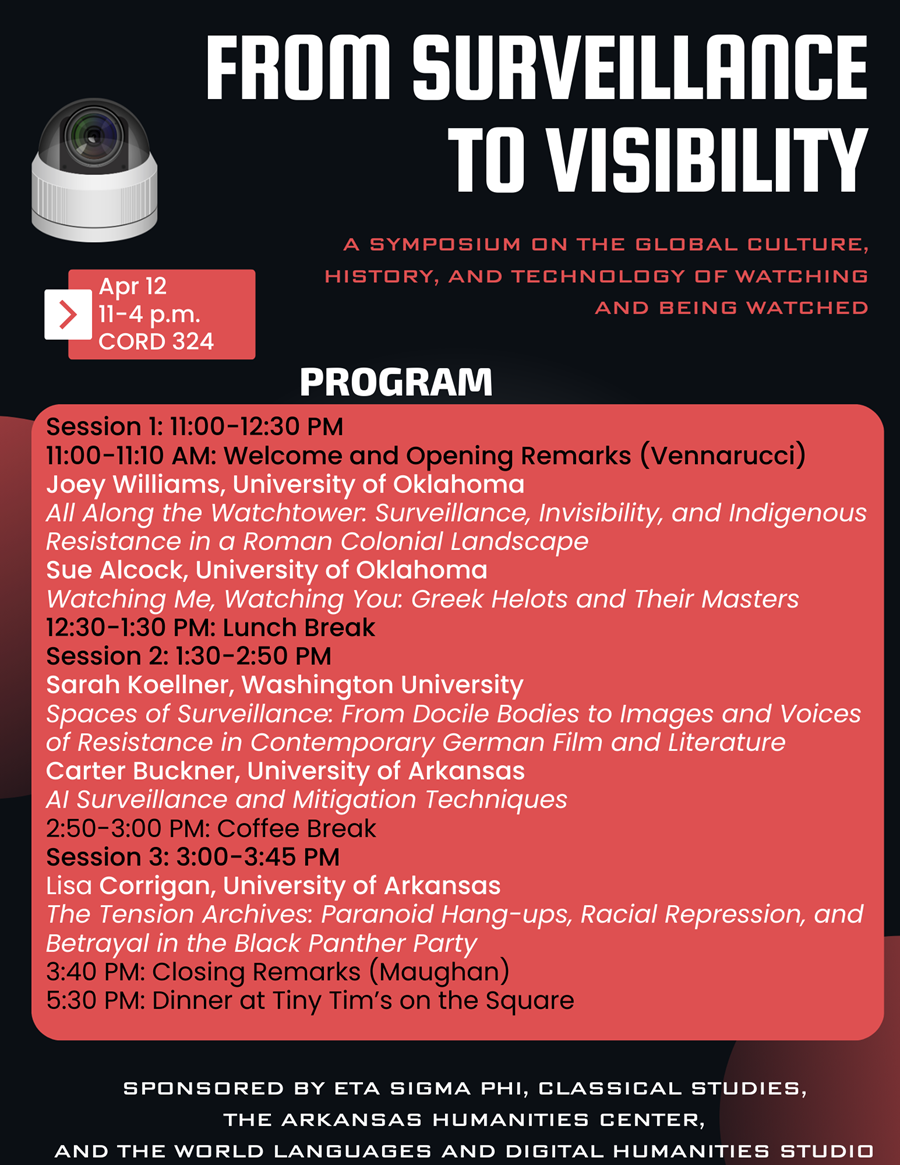
On April 12 from 11 a.m.-4 p.m., "From Surveillance to Visibility: A Symposium on the Global History, Culture, and Technology of Watching and Being Watched" will be held at the Cordia Harrington Center for Excellence (CORD), room 324. The symposium includes visiting speakers from the University of Oklahoma, Washington University and the U of A, including Lisa Corrigan, professor of communication, and Carter Buckner, doctoral student in computer science and computer engineering.
The symposium, organized by the Classics Program and the World Languages and Digital Humanities Studio, will offer cross-disciplinary approaches to issues of surveillance that include discussions of Roman colonial landscapes in Iberia, Spartans and helots, refugee camps in contemporary German film and literature, AI surveillance technology and FBI surveillance of the Black Panther Party.
Below are the session times, including panelists for each session:
Session 1: 11 a.m.-12:30 p.m.
- Joey Williams (University of Oklahoma)
"All Along the Watchtower: Surveillance, Invisibility, and Indigenous Resistance in a Roman Colonial Landscape" - Sue Alcock (University of Oklahoma)
"Watching Me, Watching You: Greek Helots and Their Masters"
Session 2: 1:30-2:50 p.m.
- Sarah Koellner (Washington University)
"Spaces of Surveillance: From Docile Bodies to Images and Voices of Resistance in Contemporary German Film and Literature" - Carter Buckner (U of A)
"AI Surveillance and Mitigation Techniques"
Session 3: 3-3:45 p.m.
- Lisa Corrigan (U of A)
"The Tension Archives: Paranoid Hang-ups, Racial Repression, and Betrayal in the Black Panther Party"
This event is open to everyone and will include lunch, as well as pizza at Tim's on the Square following the event. This symposium is sponsored by Eta Sigma Phi; the Classical Studies Program; the Arkansas Humanities Center; the Honors College; World Languages, Literatures and Cultures Department; and the World Languages and Digital Humanities Studio. The complete program is also available on the WLLC website, and the event is available on the U of A Calendar.
Please contact Curtis Maughan (cmaughan@uark.edu) and Rhodora Vennarucci (rhodorav@uark.edu) with any questions.
Topics
- Lectures, Colloquia & Symposia
- Events
- Training & Workshops
- Technology
- Student Success
- College of Engineering
- Fulbright College of Arts & Sciences
- Classical Studies Program
- Arkansas Humanities Center
- Department of World Languages, Literatures and Cultures
- Department of Electrical Engineering and Computer Science
Contacts
Cheyenne Roy, Assistant Director of the World Languages and Digital Humanities Studio
World Languages, Literatures & Cultures
479-575-4159, ceroy@uark.edu